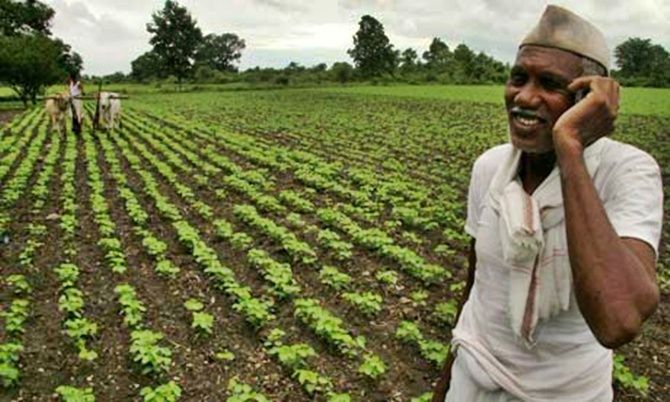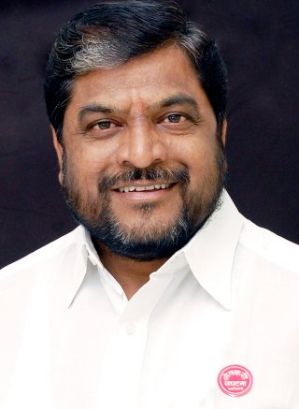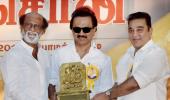'The man who has been Gujarat's chief minister for 13 years has no understanding of the ills affecting the farmers and agriculture in India.'

Raju Shetti, a farmers' leader belonging to the Shetkari Swabhimani Sanghatna and its lone Member of Parliament from Maharashtra's Hatkanagle Lok Sabha constituency, recently withdrew support to the Narendra D Modi-led National Democratic Alliance after supporting it for three years.
Shetti tells Rediff.com's Prasanna D Zore about the reasons for his disappointment with Modi and blames the prime minister for lying to India's farmers.
Why did you withdraw your support to the NDA?
During his 2014 election campaign Narendra Modi had assured farmers that they will be paid minimum support price 1.5 times their cost of production if the NDA government was elected. This was to permanently solve the crisis Indian farmers faced.
But he and his government have failed completely in meeting the expectations of the farmers.
It was only on this assurance by Modi, who was then Gujarat chief minister, that the Swabhimani Shetkari Sanghatna supported the NDA.
I had a long, one-on-one, meeting with him in Ahmedabad just before the 2014 Lok Sabha election. He did accept our demand for the 1.5 times hike in MSP and also mentioned the same in the BJP's manifesto.
He made public promises during his election rallies. I have all the video clips of his promises to the farmers. But he failed to do what he promised.
Could you share details about your meeting with Modi before the 2014 election? What assurances did you get from him before you decided to support the NDA?
I told him that round-the-year irrigation was the only solution to perpetual water shortage faced by Indian farmers.
This was not just for Maharashtra, but for the entire belt in India that is drought prone and faces acute water shortage during sowing seasons.
This belt starts from Andhra (Pradesh), Telangana and spreads across Karnataka, western Maharashtra, western Vidarbha and stretches all the way to the Chambal valley and Bundelkhand.
I told him that the government must give a strong push to bring irrigation facilities in this belt as a majority of the people in this region depend on agriculture as their only source of income.
Because of diverse rainfall and river patterns in India, we have some areas that are perennially drought prone and other areas where we have regular flooding.
The harmful effects of global warming have further strengthened this pattern.
I stressed on Vajpayeeji's (then prime minister Atal Bihari Vajpayee) ambitious plan of linking all the major rivers to solve this problem in the long term.
Were you assured by Modi then that your demands would be fulfilled if the NDA came to power in 2014?
He told me Manmohan Singh's UPA government were not too keen on the river-linking project, but he will give a strong push to the same.
He did initiate the process, but it wasn't strong enough a push to bring some viable outcome in the last three years since he became prime minister.
Did you meet the prime minister and remind him about his assurances?
On several occasions I wrote a number of letters to him reminding him about his assurances.
Also, I wrote letters to him about hiking the MSP to 1.5 times the costs incurred by the farmers.
The third point we had discussed was about setting a National Water Distribution Tribunal to put an end to disputes between riparian states about sharing river water.
This unnecessarily encourages regional identities and animosities.
Tamil Nadu and Karnataka always fight over sharing Cauvery water.
Maharashtra and Karnataka disputes arise over sharing Krishna water.
Andhra Pradesh and Karnataka fight over the Godavari.
Now, water is a natural resource. Unfortunately, water resources come under the State List (in the Constitution).
This creates rifts between neighbouring states and is harmful for national unity.
I had recommended the formation of a National Drought Redressal Commission, on the lines of the Central Water Commission, to solve these water disputes and fairly allocate waters of various rivers between neighbouring states.
Doing this would have helped solve the problems of drought-affected states and regions in India.

I had also asked him to review the root problem that makes Indian farmers get trapped under the debt burden.
On the one hand, Finance Minister Arun Jaitley keeps saying that agriculture is a state subject, but then goes ahead and formulates easy import policies at the national level.
It is because of easy imports that the Indian farmer is unable to sell his produce to Indian consumers at competitive rates.
Ultimately, that results in huge losses for the farmer and he ends up getting trapped under debt.
Your policy of import of agricultural produce is whimsical.
On a fancy you liberalise imports and on the same whim you put trade barriers on imports.
In the last four years India's agricultural imports have increased more than five times from Rs 28,000 crore to Rs 140,000 crore.
Compare this with how much debt-laden farmers have become during the same period and you will realise that the Centre's import policies for agricultural produce is largely responsible for Indian farmers' debt problems.
Indian farmers collectively are weighed down by Rs 12 lakh crore debt.
When you import agricultural produce without paying attention to the supply from Indian farmers you are encouraging prices to crash in the domestic market and the Indian farmers, due to their high cost of production, are priced out of the market.
One cannot blame the states or the farmers for this huge increase in farmers' debt.
When this is the ground reality, how can they brazen it out by saying that agriculture is a state subject?
Did you bring this to the prime minister's attention in the last three years?
I have written letters to him on several occasions and met him.
I did raise these issues in Parliament and asked for a resolution to increase the MSP for farmers to 1.5 times their cost of production.
As many as 58 MPs supported this resolution and debated it.
A few of our supporters even went to the Supreme Court, but in the Supreme Court, this government said it cannot possibly do that (increase the MSP to 1.5 times the cost of farmers' production).
Are you saying that the prime minister gave you and the nation false assurances?
Yes. Two possibilities arise out of this.
The man who has been Gujarat chief minister for 13 years has no understanding of the ills affecting the farmers and agriculture in India.
If that was not possible, he should not have given false assurances to the farmers about increasing the MSP as per the Swaminathan Commission's recommendation.
The second possibility is despite knowing fully well that it would be impossible to fulfil his promises he lied to the nation and the farmers to win their votes.
Are you saying that Narendra Modi is a liar?
Either he is lying or doesn't understand agricultural issues.
Why did it take three years for you to understand that the prime minister's assurances were 'lies'?
I tried my best, made all sincere efforts to find a way to solve the issues faced by our farmers.
I was dogged in my efforts; wrote letters to the prime minister; raised these issues in Parliament and even before the farmers publicly.
I'd have been blamed for withdrawing my support to this government without giving it enough time to solve such complicated issues.
I had to consider my decision thoroughly before taking this step and I think three years are enough to know the sincerity of a government.
Now that you have withdrawn support to the NDA government, what are your plans going ahead?
The most important issues we will raise now is to get back farmers' 7/12 extract of their land which has been mortgaged with various lenders.
We will put pressure on the government to implement the Swaminathan Commission's recommendations.
We will be creating awareness among farmers at the national level and hold this government accountable for implementing schemes for the benefit of Indian farmers.
Will Prime Minister Modi, who, as per your assessment, doesn't understand agricultural issues, or lied to farmers to win their votes, listen to your demands or work towards implementing them?
When Anna Hazare gives a clarion call for the Lok Pal and brings about a revolution in the country because of which the central government takes some measures to bring in Lok Pal, then any government will have to take concrete measures for the welfare of farmers if farmers from India rise in revolt against it.
But the NDA government has constantly maintained it won't buckle under pressure like Manmohan Singh's government.
Please remember that 50 per cent of the Indian population are farmers.
What you are saying is right because I have seen both these governments closely and this may not happen even (the NDA government will implement welfare schemes for farmers), but in our part of rural Maharashtra there is an old adage which goes like this: Eka dhotarane kahi manoos mhatara hot nahi (A young person doesn't become old by wearing just one loin cloth); in the same manner you cannot rule this country forever by winning just one election.
Are you saying that if this government fails to implement the demands of India's farmers they will vote against Narendra Modi?
If farmers can vote against Manmohan Singh's government, then what will stop them from doing the same with Narendra Modi.
Photograph: Sreeram Selvaraj











 © 2025
© 2025